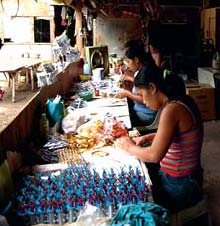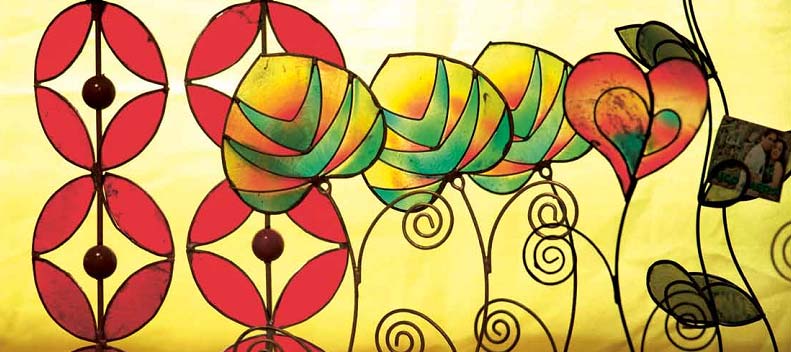Nolie Estocado
Nolie and Rogelio Estocado’s eldest child was seriously ill.
The couple did not know where they could get the money to bring the child to a doctor — much less buy medicines. They were both low wage blue-collar workers, barely meeting the family’s daily needs even with their combined income.
The eventually sought help from a cousin who had a lending business and borrowed P2,000. The cousin obliged, but when it was time for the Estocados to settle their debt, he asked for P8,000. This amount supposedly included “penalties” since Nolie and Rogelio were often delayed in their payments.
Husband and wife then vowed that this incident should never happen again. They felt so helpless, betrayed, and taken advantage of, and they resented the fact that the situation had left them without options. however, they knew they could not hope to earn anything significantly higher than what they were making since both of them were just high school graduates. They then decided to leave their jobs with a company that manufactured Christmas lights, decorations and lamps.
Nolie and Rogelio had little capital but a lot of guts, so despite the odds, they went into business. They salvaged discarded materials from their former employer’s factory, repaired them, and made them saleable. At that time, the couple sold their goods for p6 to P12 a piece. These were mostly butterfly-shaped decorations that they peddled to their friends and acquaintances. Soon, they began to receive orders, which in time became progressively larger. The business was in full swing.
Business stayed strong for the next seven years. Nolie and Rogelio were able to put all of their three children through school and provide for all their medical needs. Things were definitely looking up and the hardworking couple did not feel helpless anymore.
That is, until 1991.
Nolie remembers this year with great sadness. This was when their business failed because of a big order — to the tune of several millions of pesos — that fell through. No payment was received, and the Estocados were once again, held hostage by a situation they had no control over. With no options left, they closed shop and soon returned to being employees.
Many years passed, and the needs of the family continued to grow. The couple decided that it was worth giving the business one more try. It was with trepidation that they started anew, with Nolie fearing that the same misfortune would bring them down. She found it difficult to trust anybody again.
In 2004, Nolie was introduced to CARD, a micro financing institution that assisted beginning entrepreneurs. She and her husband underwent several grueling but fruitful weeks of training on running a business. They qualified for a p4,000 loan without collateral and used this amount to restart their business. The Estocados were amazed that a company like CARD would not only extend loans but also provide the knowledge to help its clients become better managers as well. Little by little, thanks to CARD’s trust and support, they found that they were able to overcome their issues with betrayal and fear of failure.
Soon, the Estocados were able to obtain bigger loans from CARD, boosted in part by their spotless credit record. They were able to receive bigger orders, and consequently hire more people. Thanks to the loan program for SMEs, the business was able to source better raw materials as well as build a small factory and showroom.
CARD also helped Nolie market her custom designs — “A really big help,” she says, which gave them access to markets they could never reach before.
Nolie says they are now in the golden age of their growing enterprise. Both she and her husband are still hands on in the business, but their second child, a computer science graduate, has joined them. Most orders come in and are serviced between the months of February and October. To fulfill them, they now have 60 regular employees, many of whom are women, disabled workers, or senior citizens. To encourage productivity, compensation is based on individual output.
When they were starting out, the couple had to pound the pavement and peddle their products to anyone who would show
interest, a time consuming and labor intensive process. Now, customers can visit their premises and view their products. With the bulk of the orders coming from overseas, middlemen who transact with Nolie appreciate the convenience of their modest showroom.
There is much room for improvement and growth, Nolie concedes. This is why she is very strict in enforcing uniformity in their products. It is important that the final goods are identical despite the fact that different hands put them together. Being in charge of quality control, she inspects everything to ensure that everything that leaves the factory is of superior quality.
Though he also involved in quality assurance, Rogelio has the critical task of looking after the business’ revenues and costs. The couple puts a premium on immediate cash payments over bigger orders that present no guarantee of prompt transactions. The Estocados have learned their lesson well, and Rogelio makes sure
that the never commit the same mistakes again.
The business is not without its challenges though. The threat of competition looms ever larger — especially because of China, where similar businesses are able to bring down prices significantly. In addition, export intermediaries sometimes miss their payments, which can put a strain on cash flow. Internally, running a business with many employees is always a challenge, but when issues and problems arise, the couple has learned that treating your people like members of the family is usually effective.
The couple earns modestly from margins — about 10% on bigger contracts. The rest is used for sourcing better materials and employee salaries. Nolie and Rogelio know that success does not necessarily stem just from big, one-time profits. They prefer to keep their clients happy and loyal over the long-term — hence the emphasis on quality. To improve their margins, they continue to look for opportunities to deal directly with foreign customers
instead of relying on local middlemen.
Nolie’s day starts at 3:30 in the morning and ends at 7 or 8 in the evening, six days a week. The family is only able to rest on Sundays. They are happy just sitting together in their living room, watching television. Nolie strongly feels that they have many more things to look forward to. Beyond highlighting their products, she also wants to showcase the creative and manufacturing skills of the Filipino craftsman to further strengthen the reputation of the philippines as a quality source for handmade goods.
Through it all, CARD has never let her down. Last year, Nolie was handpicked to go to Thailand for a seminar. At first, she was incredulous and felt a tad insecure at representing the institution. “Why choose me when I cannot speak English well?” Fortunately, a voice inside her urged her to accept the challenge. “You can do it,” it said, “Go on and make them proud!” And so Nolie did fly to Thailand, and she credits CARD with helping her gain the confidence she needs to deal with all kinds of people.
In one of their proudest moments yet, Citigroup recently validated the hard work and business acumen of the Estocados by recognizing the high quality of their products. This entrepreneurial award has inspired them to work harder and dream bigger.
Still, despite their current success, Nolie is proud that she and her husband have managed to keep their feet on the ground. More than material rewards, she feels truly blessed for having been instrumental in the transformation of others.
As some sort of poetic justice, the same cousin who charged them excessively for that fateful loan came knocking at their door, one day, asking to borrow a fairly large sum of money. When the time for payment came, Nolie accepted only the principal, condoning the interest altogether.
The cousin wept.
~ Nolie Estocado



